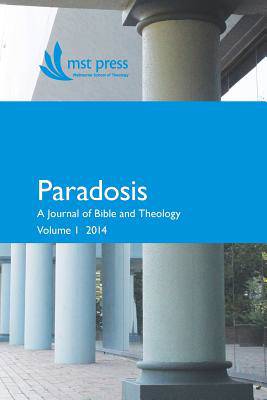
En raison d'une grêve chez bpost, votre commande pourrait être retardée. Vous avez besoin d’un livre rapidement ? Nos magasins vous accueillent à bras ouverts !
- Retrait gratuit dans votre magasin Club
- 7.000.000 titres dans notre catalogue
- Payer en toute sécurité
- Toujours un magasin près de chez vous
En raison de la grêve chez bpost, votre commande pourrait être retardée. Vous avez besoin d’un livre rapidement ? Nos magasins vous accueillent à bras ouverts !
- Retrait gratuit dans votre magasin Club
- 7.000.0000 titres dans notre catalogue
- Payer en toute sécurité
- Toujours un magasin près de chez vous
27,45 €
+ 54 points
Description
MST is launching a new journal entitled PARADOSIS, a Greek word meaning 'tradition'. PARADOSIS is chosen as the title of the journal because it expresses the sense that the theological enterprise is a continuous ministry, the ongoing 'traditioning' responsibility of the Christian church to carry forward the deposit of faith from the past, while rearticulating it in dialogue with the contexts, mindsets and issues of current culture.Admittedly, 'tradition' can have negative connotations, as in Jesus' criticisms of Scribes and Pharisees who broke the commandments of God for the sake of their human traditions. However, it has positive connotations when used in relation to the gospel of Christ and the fundamental Christian teachings received and passed on by the apostles. These form the bedrock of the Christian faith. Early believers were urged to hold fast to, contend for, and pass on this tradition.The theological implications of the gospel traditions occupied the best minds in Christendom during the early centuries following the apostolic age. The consensual conclusions they reached constitute Christian orthodoxy and the basis of subsequent theological endeavours down through the Middle Ages, the Reformation period, the Enlightenment, and the theological enterprise today.Christian theology must serve pastoral ministry, evangelism, cross cultural mission and inter-faith dialogue. From the earliest centuries Christian leaders, evangelists and apologists sought to apply theology to the pastoral needs of believers and commend the faith to others. In recent times these disciplines have flourished and are producing their own traditions. PARADOSIS will showcase articles in Biblical studies and theology.A future journal planned by MST, PRAXIS, will provide opportunity for the publication of articles in pastoral ministry, evangelism, mission and other living faiths.
Spécifications
Parties prenantes
- Auteur(s) :
- Editeur:
Contenu
- Nombre de pages :
- 134
- Langue:
- Anglais
Caractéristiques
- EAN:
- 9780992476304
- Date de parution :
- 28-07-14
- Format:
- Livre broché
- Format numérique:
- Trade paperback (VS)
- Dimensions :
- 152 mm x 229 mm
- Poids :
- 190 g

Les avis
Nous publions uniquement les avis qui respectent les conditions requises. Consultez nos conditions pour les avis.






